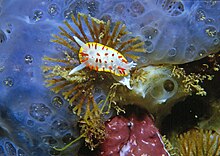Genus of moss animals
Bugula bryozoa , often mistaken for seaweed. It commonly grows upright in bushy colonies of up to 15 cm in height.[ 1] [ 2]
Distribution
The native distribution of Bugula neritina is presumed to be tropical and subtropical waters; however, it has become widespread globally due to attachment to the hulls of vessels.[ 1]
Bugula neritina Bugula neritina bryostatins , under clinical investigation as anti-cancer agents. It was first collected and provided to JL Hartwell's anticancer drug discovery group at the National Cancer Institute (NCI) by Jack Rudloe .[ 3] GPC Biotech licensed Bryostatin 1 from Arizona State University for commercial development as a treatment for cancer . GPC Biotech canceled development in 2003, saying that Bryostatin 1 showed little effectiveness and some toxic side-effects.[ 4] Alzheimers with few side effects.[ 5]
Other uses
Dried Bugula are commonly used as decorations:
"Air fern ", the so-called everlasting plant that supposedly absorbs from air all the moisture it needs to live, is commonly dried colonies of the bryozoan Bugula that have been artificially coloured.[ 6]
However, Sertularia argentea air ferns ."[ 7]
Species
Bugula alba Bugula apsteini Bugula aspinosa Bugula biota Bugula capensis Bugula ceylonensis Bugula crosslandi Bugula decipiens Bugula expansa Bugula fastigiata Bugula gautieri Bugula gnoma Bugula hessei Bugula hummelincki Bugula ingens Bugula intermedia Bugula longissima Bugula lophodendron Bugula migottoi Bugula miniatella Bugula minima Bugula neritina Bugula neritinoides Bugula orientalis Bugula paternostrae Bugula philippsae Bugula prismatica Bugula protensa Bugula providensis Bugula robusta Bugula robustoides Bugula rochae Bugula scaphoides Bugula scaphula Bugula simpliciformis Bugula solorensis Bugula subglobosa Bugula tschukotkensis Bugula umbelliformis Bugula vectifera
Species brought into synonymy
Bugula angustiloba (Lamarck, 1816): synonym of Bugulina angustiloba Bugula aperta (Hincks, 1886): synonym of Crisularia aperta Bugula aquilirostris Ryland, 1960: synonym of Bugulina aquilirostris Bugula avicularia (Linnaeus, 1758): synonym of Bugulina avicularia Bugula bengalensis Rao & Ganapati, 1974: synonym of Crisularia bengalensis Bugula bicornis Busk, 1884: synonym of Camptoplites bicornis Bugula borealis (Packard, 1863): synonym of Bugulina borealis Bugula bowiei Vieira, Winston & Fehlauer-Ale, 2012: synonym of Crisularia bowiei Bugula calathus Norman, 1868: synonym of Bugulina calathus Bugula californica Robertson, 1905: synonym of Bugulina californica Bugula carvalhoi Marcus, 1949: synonym of Bugulina carvalhoi Bugula cucullata Busk, 1867: synonym of Crisularia cucullata Bugula cucullifera Osburn, 1912: synonym of Crisularia cucullifera Bugula cuspidata Hastings, 1943: synonym of Crisularia cuspidata Bugula dentata (Lamouroux, 1816): synonym of Virididentula dentata Bugula dispar Harmer, 1926: synonym of Crisularia dispar Bugula ditrupae Busk, 1858: synonym of Bugulina ditrupae Bugula eburnea Calvet, 1906: synonym of Bugulina eburnea Bugula elongata Nordgaard, 1906: synonym of Dendrobeania decorata Bugula flabellata (Thompson, in Gray, 1848): synonym of Bugulina flabellata Bugula foliolata Vieira, Winston & Fehlauer-Ale, 2012: synonym of Bugulina foliolata Bugula fulva Ryland, 1960: synonym of Bugulina fulva Bugula germanae (Calvet, 1902): synonym of Bugula serrata (Lamarck, 1816): synonym of Crisularia serrata Bugula gracilis Busk, 1858: synonym of Crisularia gracilis (Bugula grayi Maturo, 1966: synonym of Crisularia grayi Bugula guara Vieira, Winston & Fehlauer-Ale, 2012: synonym of Crisularia guara Bugula harmsworthi Waters, 1900: synonym of Crisularia harmsworthi Bugula hyadesi Jullien, 1888: synonym of Crisularia hyadesi Bugula japonica : synonym of Dendrobeania japonica Bugula johnstonae (Gray, 1843): synonym of Halophila johnstonae Bugula leontodon Busk, 1884: synonym of Himantozoum leontodon Bugula longicauda Harmer, 1926: synonym of Halophila longicauda Bugula longirostrata Robertson, 1905: synonym of Bugulina longirostrata Bugula marcusi Maturo, 1966: synonym of Crisularia marcusi (Maturo, 1966)Bugula margaritifera Busk, 1884: synonym of Himantozoum margaritifera (Busk, 1884): synonym of Himantozoum margaritiferum Bugula microoecia Osburn, 1914: synonym of Crisularia microoecia Bugula mirabilis Busk, 1884: synonym of Himantozoum mirabilis Bugula mollis Harmer, 1926: synonym of Crisularia mollis Bugula multiserialis (d'Orbigny, 1841): synonym of Bugulina multiserialis Bugula nana Androsova, 1977: synonym of Crisularia nana Bugula pacifica Robertson, 1905: synonym of Crisularia pacifica Bugula pedata Harmer, 1926: synonym of Bugulina pedata Bugula plumosa (Pallas, 1766): synonym of Crisularia plumosa Bugula prenanti Castric-Fey, 1971: synonym of Crisularia prenanti Bugula pugeti Robertson, 1905: synonym of Bugulina pugeti Bugula purpurotincta Norman, 1868: synonym of Crisularia purpurotincta Bugula reticulata Busk, 1884: synonym of Camptoplites reticulatus Bugula rylandi Maturo, 1966: synonym of Crisularia rylandi Bugula serrata (Lamarck, 1816): synonym of Crisularia serrata Bugula simplex Hincks, 1886: synonym of Bugulina simplex Bugula sinuosa Busk, 1884: synonym of Himantozoum sinuosum Bugula spicata (Hincks, 1886): synonym of Bugulina spicata Bugula stolonifera Ryland, 1960: synonym of Bugulina stolonifera Bugula tricuspis Kluge, 1955: synonym of Bugulina tricuspis Bugula turbinata Alder, 1857: synonym of Bugulina turbinata Bugula turrita (Desor, 1848): synonym of Crisularia turrita Bugula versicolor Busk, 1884: synonym of Semidendrobeania versicolor
References
^ a b "Bugula neritina" . exoticsguide.org . Retrieved 14 February 2015 .^ Bock, P. (2015). Bugula Oken, 1815. In: Bock, P.; Gordon, D. (2015) World List of Bryozoa. Accessed through: World Register of Marine Species at http://www.marinespecies.org/aphia.php?p=taxdetails&id=110839 on 2015-09-02
^ Harford, B The Bryostatins’ Tale Chemical and Engineering News, Vol 89, No 43 PP. 10 - 17 Oct 24, 2011 accessed Dec 19, 2017
^ "Bryostatin 1" . 19 June 2006. Archived from the original on 9 May 2007. Retrieved 2009-08-20 .^ Nelsen et al., JT Bryostatin Effects on Cognitive Function and PKCɛ in Alzheimer's Disease Phase IIa and Expanded Access Trials J Alzheimers Dis. 2017; 58(2): 521–535. Accessed Dec 27, 2017
^ Frank K. McKinney. "The Bryozoa" . International Bryozoology Association. Archived from the original on 2006-12-13. Retrieved 2007-02-17 . ^
Picton, B.E. & Morrow, C.C. (2016). Sertularia argentea Linnaeus, 1758.
Costello, M.J. et al. (Ed.) (2001). European register of marine species: a check-list of the marine species in Europe and a bibliography of guides to their identification. Collection Patrimoines Naturels, 50: pp. 325–333
Fehlauer-Ale, Karin H., Winston, Judith E., Tilbrook, Kevin J., Nascimento, Karine B. & Vieira, Leandro M. (2015). Identifying monophyletic groups within Bugula sensu lato (Bryozoa, Buguloidea). Zoologica Scripta
External links
Bugula at Wikispecies
